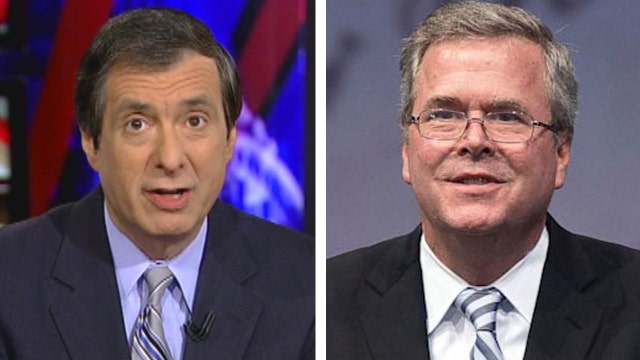Kurtz: Jeb Bush, under the media microscope
'Media Buzz' host on scrutiny ahead of former Florida gov's potential 2016 run
The country is about to meet the Jeb Bush of 1994, courtesy of the mainstream media.
Even as Mitt Romney sends the press signals that he kinda sorta wants to run again, Bush is no longer being treated as a mere potential candidate. That means journalists, rather than simply handicapping how he’d do against this or that challenger, are starting to dig into his record.
Thus we have the “head-banging conservative,” which is how Jeb described himself when he first ran for Florida governor two decades ago. As The Washington Post reports:
“Women on welfare, Bush said, ‘should be able to get their life together and find a husband’ or other ways to support themselves. Gays and lesbians, he said, do not deserve special legal protections because ‘we have enough special categories, enough victims, without creating even more.’ Asked what he would do for African-Americans, he famously said, ‘probably nothing,’ explaining that he wants ‘equality of opportunity’ for all people.”
The oppo phase is under way.
The Post piece is fair, but its framing is clear: When Bush ran as a harsh right-winger in 1994, he lost. When he moderated his tone in 1998, he won. Therefore, he has “grown” into the more moderate Republican he is today, and that makes him more electable.
Sure, Bush adviser Sally Bradshaw is quoted as saying “he didn’t change his core principles.” But in our polarized media atmosphere, the ex-governor is likely to face an intense round of scrutiny over this question: Which one is the real Jeb?
It will be a mini-Mitt marathon, with two lines of attack:
Just as Romney governed moderately in Massachusetts (passing the early version of ObamaCare) and then cast himself as a “severely conservative governor,” is Jeb really the guy who was dismissive of special efforts for blacks, gays and low-income women?
When he recently made conciliatory noises about Florida becoming the 36th state to adopt same-sex marriage, was Bush just hiding his true feelings?
As fellow Floridian Debbie Wasserman Schultz, the Democratic chairman, told the Post in an early tipping of the hand: “There is not a moderate bone in his body.”
Of course, more conservative GOP primary voters may be more comfortable with Bush if they come to believe that beneath the soothing rhetoric, he’s one of them. That will be a tough sell, though, if he clings to his positions on immigration reform and Common Core education standards.
The other line of assault will be that Bush is just a flip-flopper who doesn’t believe in much of anything except getting rich. This, too, became a big problem for Romney.
Much of the early media chatter about Jeb has focused on his establishment pedigree and the baggage of his brother. But now that he’s formed a PAC, news outlets will start pressing him about specific policy stances, reversals and contradictions.
Romney will get the same treatment if he moves out of the trial balloon phase and gets serious about a third presidential bid. The odd thing about his stage whisper to a group of donors, which made its way to the Wall Street Journal, is that it follows a couple of years of Mitt telling every journalist who asked that he’s not running and has no plans to run.
And then there’s the damaged-goods question. No general-election loser has won the presidency since Richard Nixon in 1968, and before that it was Grover Cleveland. A lot of folks may simply say, Well, Romney had his shot.
The press seems eager for Romney to get in, which is strange because he had lousy relations with the media in 2012 and didn’t get terribly good coverage. Another explanation is that he made all kinds of errors and was hardly a natural at retail politics. Some Romney advisers told Time they are skeptical that he’ll actually take the plunge again.
One possible advantage for Romney is that so much stuff was thrown at him in the last campaign that this time around it could seem like old news. The same can’t be said for candidate Jeb Bush.





